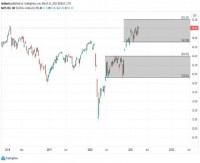|
By Mark Melin A commissioner at the Commodity Futures Trading Commission is expected to unveil a new method of defining High Frequency Trading, an elusive task for US regulators to date. CFTC Commissioner Bart Chilton is expected to detail the proposal in March 19 speech to commercial hedgers in San Francisco. The proposal is expected to define HFT participants based on their relative market impact only during periods of volatile or otherwise market damaging market behavior. Market participants identified as engaging in HFT who were also responsible for a high percentage of a negative market move could face fines or other regulatory actions, according to sources who have seen the presentation. Defining HFT has always been a problem, particularly with regards to differentiation with market marketing activities – the linchpin in a successful and liquid market. It is unknown how such a definition could differentiate between legitimate hedging interests and HFT based on volume in a negative market move, among other early questions. Key Concern One inner fear among knowledgeable market observers is the flash crash. Even the most sophisticated of managed futures algorithms would not likely benefit in a flash crash type volatility due to the time horizon variable (assuming trades were not invalidated). Managed futures rarely utilize HFT tactics, a strategy more commonly associated with proprietary trading operations. The concern with HFT relative to a flash crash is that HFT could significantly increase negative market momentum. A key point to consider is the triggering of cascading stop orders, which generates a certain volatility profile that can be detected by the "electronic eye" of computer-based market making systems. While it wasn't widely reported, such electronic volatility detection systems were said to pull market bids and offers during the flash crash of May 6, 2010, exacerbating if not the key contributor to the event. Certain elements within the managed futures industry have been mapping crash potential scenarios relative to the US debt crisis. Among the worst case situations is a flash crash fundamentally sparked by a lack of confidence in US debt instruments. The cause or motivating factor of future market crashes is unknowable, yet the goal to create stable market environment endures. While the exact details of Commissioner Chilton's proposal are at this point unknown, focus appears to apply around the apparent concept of deterrence (fines and penalties for violators) along with a definition of the activity based on when the time period that matters most, during times of volatility or market crisis. If ultimately adopted, the proposal would push the CFTC to the forefront among US regulatory agencies to accomplish the task of defining HFT to a certain degree. Would you like to know the difference between HFT and managed futures strategies? The author is available to chat Tuesday and Thursday from 4-5 PM CST. Click here to visit www.uncorrelatedinvestments.com (requires free registration). |
|
This article was published in Opalesque Futures Intelligence.
|





 RSS
RSS











